Chalchitra & Patachitra – the fading art forms which form the backdrop of Durga Puja
The Durga Puja pandals and idols would be incomplete without the handiwork of Patachitra & Chalachitra artisans.
Written by Shreya Das | Kolkata | Updated: October 14, 2018 10:31:51 am
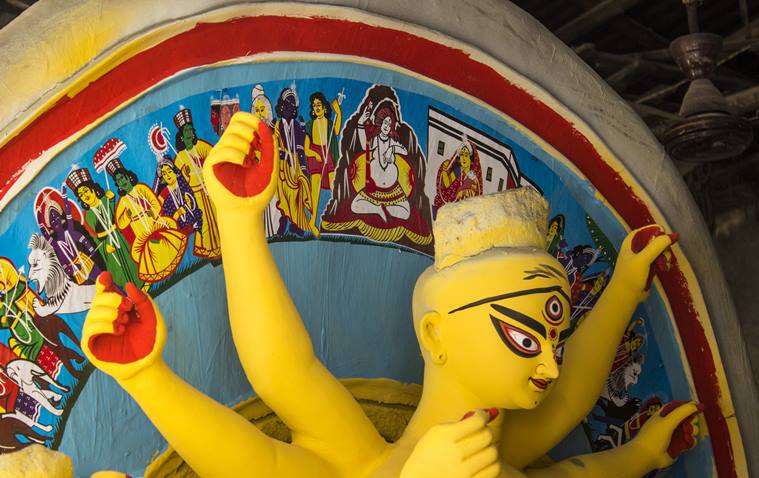
Chalchitra is the painted backdrop against which the idols are placed. (Source: Express photo by Shreya Das)
When one thinks about Durga Puja, more than the celebrations and festivities, it’s the plethora of art and talent that is the soul of the biggest festival of Bengalis. At the heart of the festival is the relentless efforts of thousands of artists working day and night to bring together this festival. One of the essential aspects which artists and artisans are involved in and which often doesn’t get the attention it deserves is Chalchitra.
Chalchitra is the painted backdrop against which the idols are placed. It’s supposed to be subtle, not steal the spotlight from the idol or the pandal, but accentuate both. As preparations in Kolkata and the rest of Bengal are in full swing in the final days leading up to the Durga Puja, in the lanes near Liberty Cinema Hall in Girish Park, makers of Chalchitra are in a rush to meet deadlines. Making more and more frameworks to complement the idols and adding the final touches to set the festive mood.
Made with bamboo, the half-dome framework used to be originally covered in clay and cloth and then hand-painted to depict mythological tales about the life of Ma Durga – also known as known as Patachitra. The word originates from the word called “Chala” which mean covering and was considered an important part of the traditional puja.
“When our fathers used to do this business, Ekchala Promita was the order of the day and we used to get big orders for making huge backgrounds. Then slowly, times changed and artists started creating idols separately, which increased our work and our revenue,” says 72-year-old Radhakanta Borel. However, with time, new themes have led to a decrease in the demand for Chalchitra. “While we used to get orders of around even 80 in a day, now we hardly manage to get 40 to 50 in the whole season,” reminisces the father of one, whose son only lends a hand in the business around the festive season.
Where earlier the artisans used to work round the year, now work is restricted to only a few months – from early August to November. Most spend their time making structures and frameworks used for parties, weddings and other events, according to Sagar Pagre, 56, who has been associated with this profession since his grandfather taught him how to identify the correct kind of bamboo for the framework.
To ensure the right proportions for each structure, requires a keen eye for and great skill in symmetry. After the workers cut and attach different pieces of bamboo canes together, the frame is then passed down the production line and papers, instead of traditional cloth and clay, is attached to it. The structure is primarily built by men, who earn upto Rs 1200 a day. The papers, though, are placed on the structures by everyone from men to children and women, but fetch workers up to only Rs 300 for an entire background.
This festooned frame is then sent to Kumartuli for the final touches, whether to be painted or adorned with shola artwork and Patachitra. While makers here often sell a structure set to the sculptors in the potter town for around Rs 5000, if approached directly by the puja committees, it can fetch a much higher price – even double the amount.
It’s when the paper-plastered structures reach the idol hub of the city, that they get a glamorous makeover. From coloured beads to sequins and even intricate threadwork, the margins are decorated with identical suspended patterns.
Even though Chalachitra is still being made, the art form which is slowly dying out is Patachitra. The intricate paintings of mythological scenes are very rarely done by hand. “Neither do we have the time to invest in painting each of these few feet long narrations, nor do we have people who have the expertise to replicate the traditional structures,” says Bishwanath Saha, 45.
Nowadays, much of it is printed for mass reproduction. “Earlier these used to be done by artists coming from Krishnanagar and Midnapur, now they no longer want to do the work for so little money. It takes around three hours to draw a Patachitra extending just two feet,” adds Laltu Saha, 48.
A few artists with smaller workshops, with only about 30 idols to make during the peak season still hand-paint their own Patachitra and paste it across the structures. “We draw it ourselves, we don’t like the printed ones, it doesn’t have any soul,” argues Santu Pal, who has been drawing these for last 30 years. “As long as I have the eyes and the strength in my fingers to hold a brush, I’ll keep doing this, but it might end with me as my children want an easy way out,” adds 65-year-old, Pal.
It might well be the effort to visit the Durga Puja pandals not just to participate in the community festival, but to also witness and support these slowly fading artforms.






















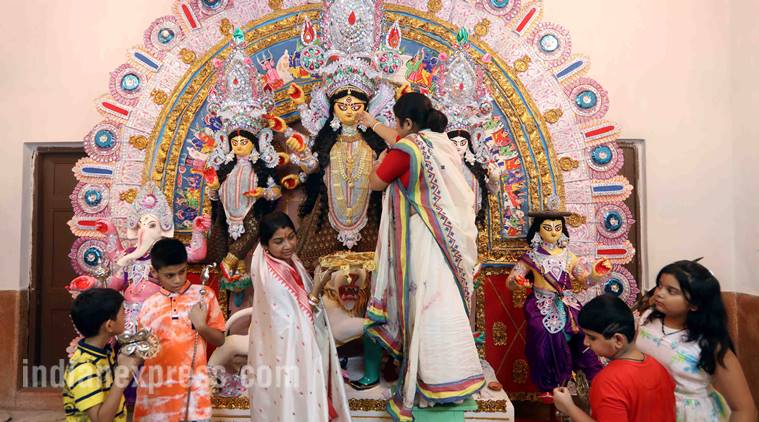 A traditional ‘Ekchala Protima’ at a family home in Kolkata. (Source: Express photo by Partha Paul)
A traditional ‘Ekchala Protima’ at a family home in Kolkata. (Source: Express photo by Partha Paul)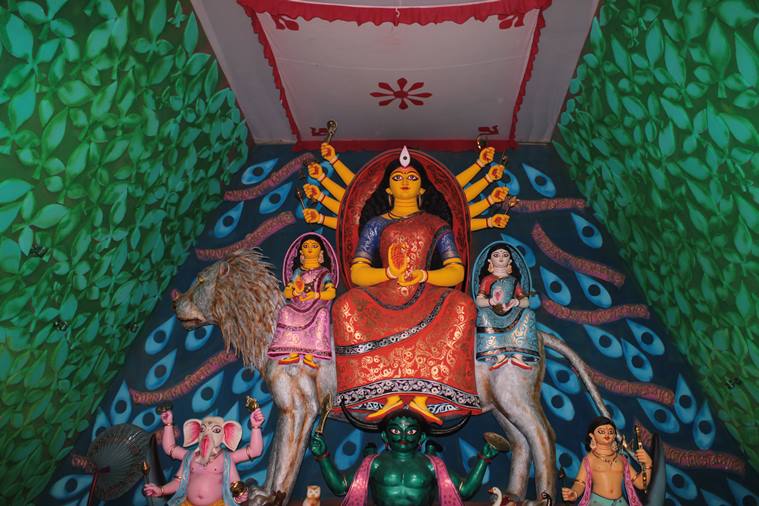 New-age idols at a theme puja, where Chalchitra has not been used. (Source: Express photo by Shreya Das)
New-age idols at a theme puja, where Chalchitra has not been used. (Source: Express photo by Shreya Das)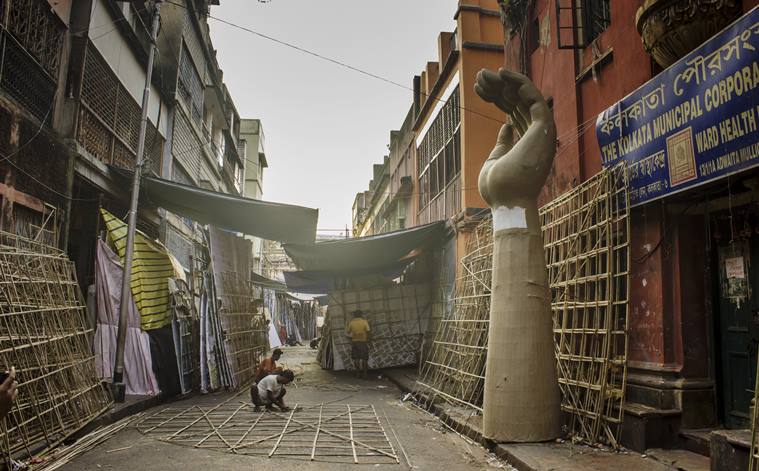 The big structures are made with bamboo canes. To ensure the right proportions for each structure, requires a keen eye for and great skill in symmetry. (Source: Express photo by Shreya Das)
The big structures are made with bamboo canes. To ensure the right proportions for each structure, requires a keen eye for and great skill in symmetry. (Source: Express photo by Shreya Das)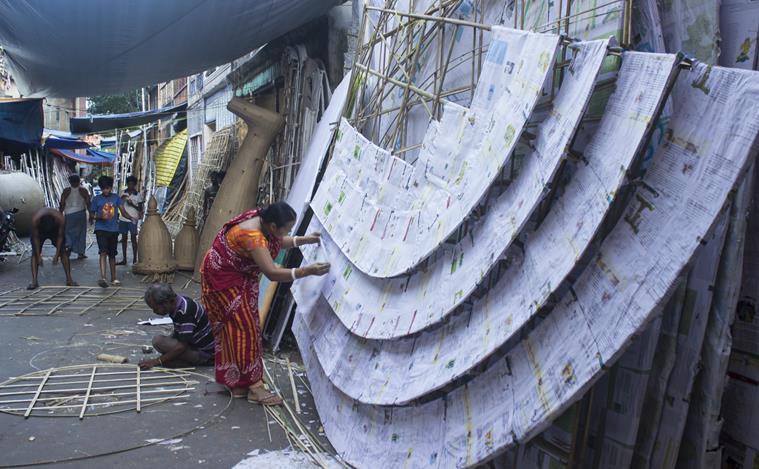 The frame is then passed down the production line and papers, instead of traditional cloth and clay, is attached to it. (Source: Express photo by Shreya Das)
The frame is then passed down the production line and papers, instead of traditional cloth and clay, is attached to it. (Source: Express photo by Shreya Das)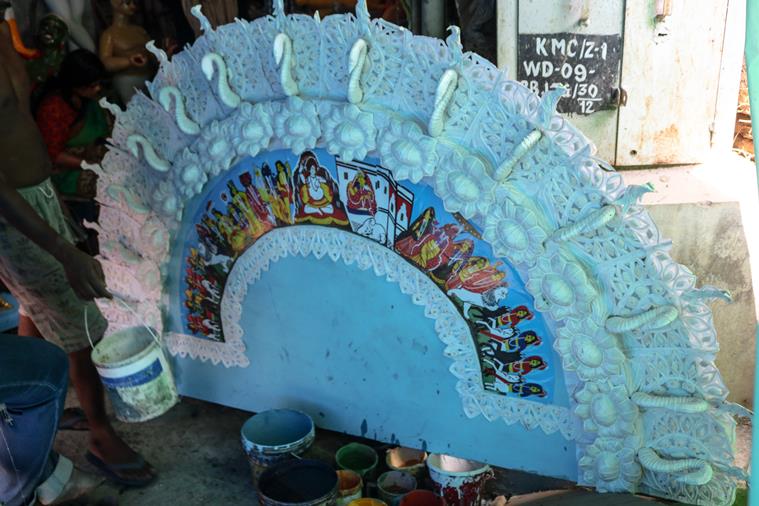 A wooden structure of Chalchitra ready to be placed behind the Durga idol. (Source: Express photo by Shashi Ghosh)
A wooden structure of Chalchitra ready to be placed behind the Durga idol. (Source: Express photo by Shashi Ghosh)
No hay comentarios:
Publicar un comentario